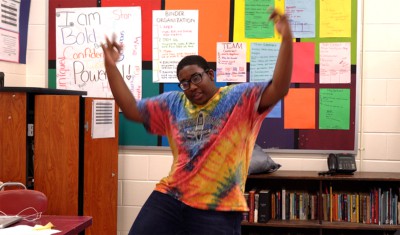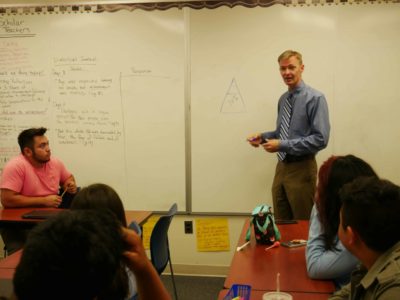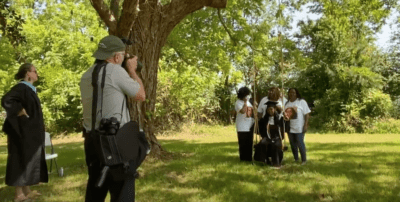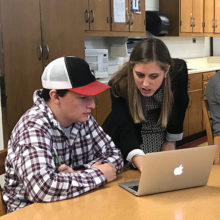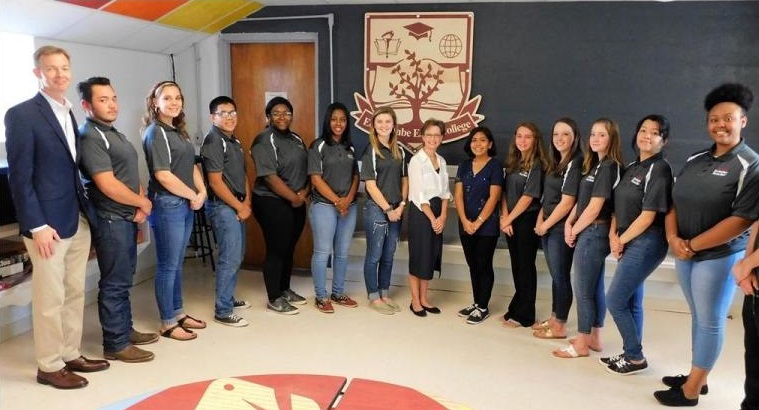
When Jacqueline Dickens’ teachers told her she would make a good teacher, she brushed it off. “In my head, I’m thinking, ‘Teaching? I think I could do a little bit better,'” she said.
At the time, Dickens attended North Edgecombe High School, a small, rural school in Edgecombe County. Her teachers were encouraging her to apply for a new program designed for students who are interested in teaching.
While Dickens grew up in a family of educators — her mom taught at the local public school — she looked at teaching more as a fallback option rather than the career she wanted to pursue.
“I thought [teaching] was too easy,” she said. “I thought that I could pursue it later on.”
That all changed when she started the Scholar Teachers program at Edgecombe Early College High School.
“Thinking being a teacher was easy went out the door,” Dickens said. “That mentality was definitely gone.”
Dickens is now in her junior year at East Carolina University studying to become a teacher. When she graduates, she is planning to move back to Edgecombe County to teach.
“I definitely want to make the place that I came from better,” Dickens said, “and I think that I have the qualities as a person that will make me an exceptional teacher. I have the heart for children. I love my community. I love the people that I meet. I care about the people that I meet. I care about the children that I see, and I want them to do great things. I want them to be better.”
A program born out of necessity
Dickens is committed to becoming a teacher and returning to Edgecombe County thanks to Edgecombe County Public Schools’ Scholar Teachers program. The program recruits and trains high school students interested in teaching and gives them a scholarship in college if they commit to returning to Edgecombe County to teach.
The Scholar Teachers program, now in its fifth year, was born out of necessity. From 2006 to 2018, one of every five teachers in Edgecombe County Public Schools (ECPS) left the district each year on average — a trend found in many rural districts.
“As we began looking at our 20% teacher turnover rate,” Edgecombe Early College High School Principal Matt Bristow-Smith said, “the question emerged about what systemic changes we could make that are within our own locus of control to help develop a more qualified teacher pipeline that is uniquely prepared to meet the needs of our district.”
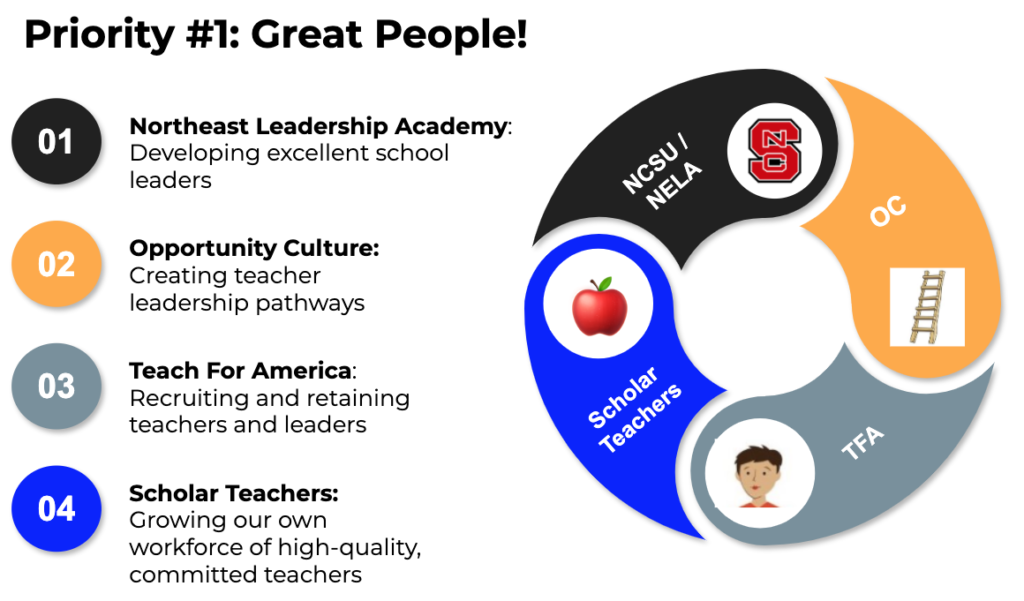
District leaders began to discuss what a grow-your-own teacher program might look like. They decided to base it at the early college, Bristow-Smith said, “because we knew we were likely to develop college-going students at our school anyway.”
The Scholar Teachers program is one part of the district’s larger strategy to recruit and retain great people. That strategy involves four components, outlined in the graphic above.
“This is the first time that our county has made a commitment to a grow-your-own teacher pilot program,” Bristow-Smith said.
Sign up for the EdDaily to start each weekday with the top education news.
The Scholar Teachers model
Bristow-Smith describes the Scholar Teachers program as an Edgecombe County version of the North Carolina Teaching Fellows program.
“The main purpose of this program is to ensure that every child in Edgecombe County Public Schools has a highly qualified teacher leading their classrooms,” he said.
Interested students from across the county can apply to start the program at the beginning of their junior year. If accepted, they must transfer to the early college if they are not already enrolled there, like Dickens. Students start the program during their junior year of high school.
For their first two years, students complete four courses designed to introduce them to the basics of teaching. Scholar Teacher Director Leigh Ann Webb developed the curriculum for these courses, which focuses on topics like understanding the North Carolina standards, creating trust in your classroom, lesson plan design, student tracking and assessment, and differentiated instruction. Webb focuses on teaching her students the importance of building relationships with their students.
“I want them to get to know the ones that they’re teaching,” Webb said, “to see the students and their struggles and where they’re coming from.”
Both Webb and Bristow-Smith emphasized that the goal of the program is not to supplant the training students will receive in college. Instead, they see it as a way for students to explore the career of teaching and to form connections with ECPS that will inspire them to come back.
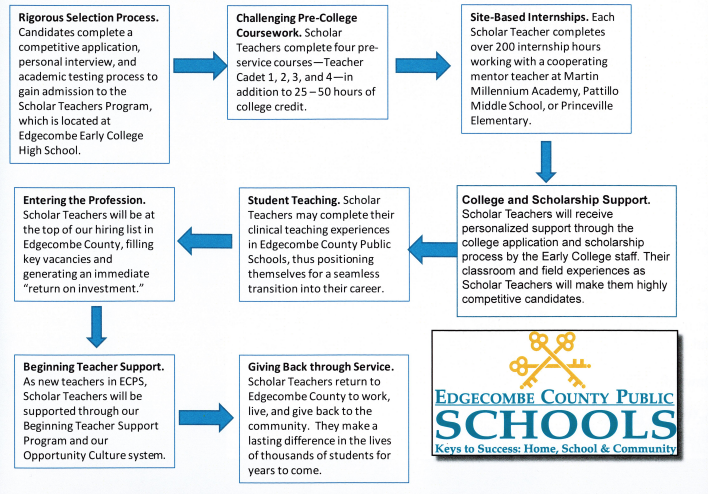
Along with their courses, the students also complete internships once a week with mentor teachers at three schools in the county. During these internships, students observe the mentor teachers, teach their own lessons, and receive feedback from their mentor teacher. They submit a portfolio every six weeks that includes lesson plans and reflections on their internships. By the end of the program, the students complete over 200 internship hours.
Amanda Mongillo teaches sixth grade science at Pattillo Middle School and has been a mentor teacher for the past four years. She was also recently named ECPS 2020 Teacher of the Year. Mongillo said her experience as a mentor teacher has inspired her and reminded her of why she became a teacher.
“I think it’s just really good for the school, the students in the classroom, the Scholar Teachers — everybody that’s involved grows with it,” Mongillo said. “I don’t think that I would be where I am without the opportunity to learn from the teachers at the early college and the Scholar Teachers in my classroom.”
Unlike a traditional high school, the early college students also complete a fifth year — what Webb and Bristow-Smith refer to as their super senior year. During this time, students focus on their college courses and continue with their internships.
Throughout the program, Webb and Bristow-Smith bring in guest speakers to talk to the Scholar Teachers, including other teachers, principals, administrators, and Scholar Teachers like Dickens who are now in college. Bristow-Smith said they are intentional in trying to introduce the students to as many different parts and people in the district as possible.
“We want Edgecombe County to be the most familiar district,” he said. “We want to be as familiar as we possibly can because we want them to come back to us.”
Once students are in their final year of the program, they receive guidance throughout the college and scholarship application process. Because they are taking college classes at the early college, they will enter college as sophomores.
Each student in the program can apply for a $10,000 college scholarship every year for three years. In exchange for the scholarships, they agree to return to teach in Edgecombe County for three out of their first seven years after graduating college.
These scholarships are entirely funded by private philanthropic dollars from the community. Bristow-Smith said the biggest challenge they have encountered has been fundraising to support the scholarships.
Beyond the scholarships, the cost to run the program is mainly personnel. The personnel costs include half of Webb’s salary along with the time spent building and overseeing the program by Bristow-Smith, Director of Innovation Erin Swanson, Superintendent Valerie Bridges, and Communications Coordinator Susan Hoke.
“I found that systems that work put the resources behind what they value,” Bristow-Smith said. “What is the value of making an investment in young people who then come back and make an investment in the classroom and in the community? I think that value far outweighs the cost.”
How will they know if they are successful?
The ultimate measure of success will be the number of students who come back to teach in Edgecombe County, Bristow-Smith said. Along the way, however, they have interim metrics, such as the number of internship hours students accumulate, the number of students who complete the program, and the number who apply and get accepted to a college of education.
While several students in the program are now in college, it is too early to know how many will graduate and move back home to teach. Bristow-Smith is feeling confident, however.
“I’m very confident based on what I’m seeing,” he said. “We keep up with the kids, and Leigh Ann does. Every week she reaches out and communicates with them. So we feel very sure that their trajectory is going to bend back towards Edgecombe.”
While the number of students who complete the program is one benchmark for success, Bristow-Smith does not see it as a failure if students drop out of the program or decide at the end they don’t want to become a teacher. For Webb and Bristow-Smith, they see it as a win if this program helps students choose a different path in high school before investing time and money in college only to realize they don’t want to be a teacher.
“The last thing that we want is for those students to get into college, to complete a program, to get into the classroom for their student teaching their very last semester,” Bristow-Smith explained, “and then for them to realize, oh, I’ve accumulated a lot of debt getting a degree in a field that I really don’t want to commit to.”
When asked why he joined the program, Diego Alonso-Galindo, said, “I wanted to join the Scholar Teachers program because I was unsure if I wanted to become a teacher or not. But once in the program, I learned that I wanted to give back to my community.”
Another student, John Taylor, wants to be an English as a Second Language teacher. He joined the program to get more exposure to the teaching profession. “This is just a good way to get some practice under my belt and to help me really see all the behind the scenes of what happens in the classroom,” he said.
Sydney Bristow-Smith, the daughter of principal Matt Bristow-Smith, said she’s always wanted to be a teacher so it was natural for her to join the program. “I’ve seen how so many of the teachers I’ve had have affected me, and I want to be that for other people,” she said.
Lessons learned
Bristow-Smith’s biggest piece of advice for any district hoping to start a similar grow-your-own program is to start small with an established principal and an amazing instructor.
“Leigh Ann Webb is National Board Certified,” he explained. “She’s from Edgecombe County. She graduated from this district, she has taught in many of our high schools, and she was our Edgecombe County Teacher of the Year last year. She represents the best in all educators. That’s the person that I want to put our future candidates in front of.”
Webb agreed. She said, “Make sure the leader of the program is very enthusiastic about teaching as a calling, not just a career, and who will get the future teachers in the program enthused about becoming a teacher and returning to teach in your county.”
Bristow-Smith and Webb also spoke about the importance of the internship experience. “That’s really where the magic happens,” Bristow-Smith said. Webb advised districts to “make sure the internship teachers who work with the Scholar Teachers as interns are veteran teachers in your county who will be outstanding role models for the future teachers.”
Finally, Bristow-Smith emphasized the importance of iterating the program and gave the example of how they have changed and developed the curriculum over the past five years. “Programs have to evolve over time,” he said. “It’s not a one and done process.”
Webb said her decision to leave her classroom to run the program was difficult but well worth it. “It’s laying the groundwork for years ahead,” she said. “I was really torn about leaving the school I had been at for so long and leaving my students there. I thought I can stay here at Southwest and influence 150 kids that I teach every year. Or I can go and teach future teachers, and I can keep on impacting classrooms.”
Looking ahead
As the Scholar Teachers program enters its fifth year, their first cohort of students are working their way through college. Dickens just started her junior year at ECU and is back home after all her classes were moved online just two weeks into the semester.
Dickens has already felt the impact of the Scholar Teachers program in her college classes. “Having that early experience before I went off to college helped me when I got to college in a lot of different areas,” she said. “When it was time for me to do my internships in college, I’d already had that exposure, so I had that step ahead.”
Webb checks in with Dickens and the other Scholar Teachers in college every week to see how they are doing and keep them updated on everything happening at home. She invites the college students to come back as guest speakers, and they give Webb feedback on the Scholar Teacher curriculum based on their experiences in college.
The switch to virtual learning due to COVID-19 means the Scholar Teachers courses are now online. It also means their internships are now virtual, so students are learning how to adapt and teach lessons virtually alongside their mentor teachers.
“We wanted them to see up front in the life of an educator, how these master educators were responding to being in plan C for the start of school and trying to teach their classes remotely,” Bristow-Smith said. “There’s inherently some important lessons to be learned about resilience and growth mindset and teacher innovations in this pandemic, so we wanted our kids to see that.”
Beyond the pandemic, the district hopes to find the funding to expand the program and offer scholarships to more students. Dickens agrees.
“I definitely want people to invest in the Scholar Teacher program so we can make it a bigger program so that you have a larger impact on this county,” she said.
Bristow-Smith envisions a future where the North Carolina Teaching Fellows program expands to include community colleges as they start offering associate degrees in teaching. In the meantime, however, he is looking forward to the first cohort of Scholar Teachers returning to Edgecombe County as beginning teachers in just a few years.
Recommended reading
